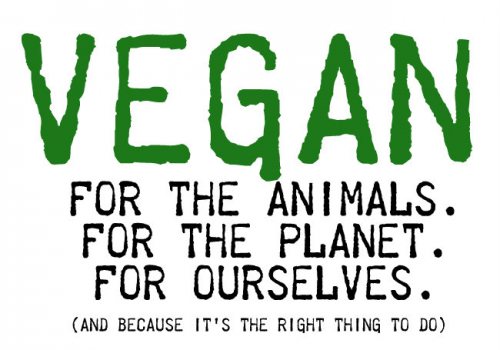The Herbivorous Choice: A Moral Dilemma of Eating Meat

A vegan propaganda supporting the vegan lifestyle
May 23, 2018
Ingrained into American culture is the consumption of a variety of animal products. At essentially every restaurant, meat is a constant on the menu. Even items that are traditionally vegetarian have become laced with bacon, ground beef, or other forms of meat. Yet with this diet being a major facet of American culture, the ethics of consuming meat has been ignored. With revolutionary health movements and the rise of veganism, more people are beginning to contemplate the morality of being a carnivore.
Consuming meat provides many great health benefits. Items like poultry and fish provide many nutrients such as protein, B vitamins, iron, zinc, magnesium, and more. Yet many animal products can also cause several health problems. Processed meats such as hot dogs and bacon are known to cause colon or rectum cancer while other animal products, such as dairy or eggs are known to increase the risk or heart disease, diabetes, and erectile dysfunction. Most importantly the carnivorous diet decreases the life span. A study showed that meat eaters tended to live shorter than vegetarians and vegans. (Bustle) Overall, the best thing to do for one’s body would be to either limit or stop one’s intake of both meat and other animal products.
The raising of livestock also exhausts the earth’s land, food, energy, and water supply. Over 50% of the global greenhouse-gas emissions come as a result of animal agriculture. The amount of water it takes to grow crops for the animals, clean the farms, and hydrate the animals takes gallons and gallons of water. The amount of air and water pollution is also extreme and the land use for livestock is highly inefficient. (PETA) In order to combat the variety of environmental issues such as global warming that have arisen as a result of animal agriculture, a worldwide shift towards a vegan diet must occur.
In combination with the health and environmental issues that consuming meat presents, there is a moral dilemma that is also present. The raising for slaughter and consumption of millions of animals each year is a fact that can be perceived as quite upsetting. The industry of factory farming is known for its lack of humanity in their treatment of animals. With a goal to maximize output, animals are crammed into crates and cages, with sometimes no chance of ever going outside. Their lives are tortuous with many dying of disease and infection before they can be slaughtered for human consumption. Living in constant torment, fear, and discomfort, the animals’ resources are completely exhausted before they are crammed into trucks and taken to be slaughtered. Nicole Smock (10) stated that her choice to become vegetarian was decided when, “I watched a couple videos on how animals are handled when they are being slaughtered and it was really sad and cruel. I didn’t like the process and wasn’t going to continue consuming these animals.”
Overall, a major choice is faced when deciding whether or not the consumption of animals is the best decision ethically, environmentally, and health wise. The decision is a hefty one, yet one that must be thoroughly considered. A dilemma is facing each person in the eye, asking them to contemplate their diet.





































